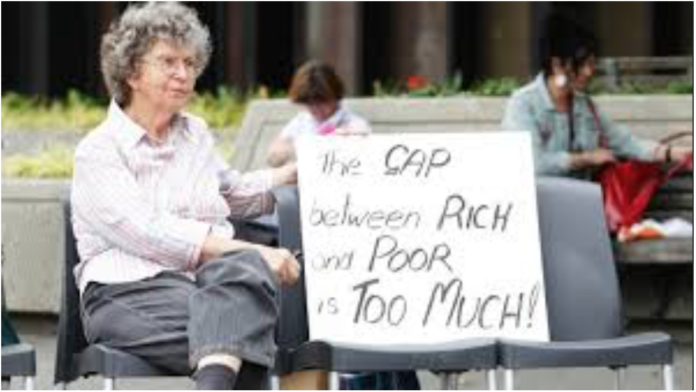From the world’s perspective, New Zealand looks like a paradise. Lush green hills and stunning picturesque landscapes as far as the eye can see. Modern cities and friendly populations. A can-do, welcoming spirit. It’s a paradise – the kind of utopia envisioned only in fictional works.
For Kiwis today, though, New Zealand is more like a tale of two cities than it is a utopia. It’s a place where massive income inequality has reconfigured what was once a nation firmly rooted in egalitarianism. Beginning in the late 1980s, we moved from one of the most economically equal nations to one of the most unequal, all the while watching the nation’s growth rate stagnate.
As that’s happened, our major political parties have presented us with two kinds of options: defending the status quo (the Labour party), and more massive giveaways to the wealthy (the National party). In truth, it’s pretty obvious that neither approach is going to right the wrongs of today’s economy. Here’s a quick primer on what’s causing New Zealand’s massive income inequality, and what needs to be done to fix it.
The Tax Cut Myth
Back in the late 1980s, New Zealand’s economy went through a period of major deregulation and a reorientation toward free-market principles. Then, a stock market crash crippled the national economy – an event that we’ve never quite recovered from, economically speaking. In the immediate aftermath, the national impulse was to raise taxes to pay for the government programs needed to right the ship, but in fact, the opposite happened.
Since that time, income and business taxes have been cut in dramatic fashion. The tax cuts, intended to spur growth and reinvigorate the economy, instead lined the pockets of wealthier citizens, who used it to invest in property and shares. Since the gains from such investments aren’t taxed here, the result was a major wealth transfer toward the top 10% of earners. It also started the cycle of the housing market overheating, which had additional negative economic effects.
Housing Costs Climbing
Since property is something of a tax haven here in New Zealand, it’s become a popular place for those with means to invest. The result is that our housing market is severely unaffordable for the average kiwi. Housing costs are taking an ever-larger bite out of the average worker’s pay, leaving less leftover for savings, retirement, and investment. That’s having the effect of pushing earners in the middle to lower end of the scale further away from top earners. With every dollar that must go towards housing costs, the income gap widens further. At the same time, the economic stagnation is keeping interest rates low, punishing savers and encouraging further property speculation. It’s a time bomb that’s waiting to blow up a major part of our economy.
Unemployment Low, Underemployment High
In recent years, plenty of headlines have trumpeted the fact that New Zealand’s unemployment rate is hovering at or near historic lows. All other things being equal, that should be producing some major wage growth, but that hasn’t been happening. A big reason for that is another, typically ignored statistic: the underemployment rate.
It’s data that captures the number of people working jobs for fewer hours than they need or want, or for salaries that don’t cover their expenses. They’re the working poor, and they make up between 4% and 5% of the workforce. A rate that high illustrates that the quality of the jobs held by kiwis isn’t uniformly great, and that helps to keep wage growth flat. After all, why give someone a raise when there are other underemployed people who would be happy to step into a new full-time position with no increase.
What Must Be Done to Fix It
The sad reality is that there are no easy answers in the quest to fix New Zealand’s present income inequality problem. A good start would be to work harder to undo the tax cuts given to top earners over the past 30 years. The revenue could then be used to subsidize education programs that increase access to online courses in New Zealand or reduce the debt burden faced by university graduates. It could also fund programs to help kiwis in dire need of financial assistance – a number that’s growing daily.
Better still would be a wholesale reworking of the present tax system, including scrapping the GST on food and other necessities, reviving the stalled effort for a capital gains tax, and rewriting the WFF to include inflation indexing and changing marginal rates to eliminate the penalty for workers who better their situations. In other words – to create a tax system that rewards wage earners for working harder, shifts the burden to capital, and makes it possible for everyone to get ahead.
Now, all we have to do is find the political will to make all of that a reality. And that may turn out to be the biggest hurdle of them all.




